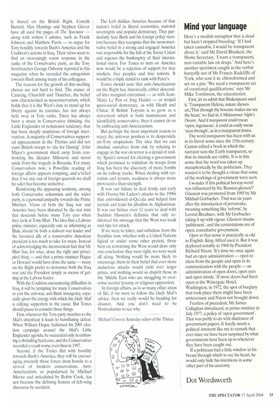Mind your language
Here's a modish metaphor that is dead but hasn't stopped breeding: 'If! had taken cannabis, I would be transparent about it,' said Mr David Blunkett, the Home Secretary. 'I want a transparent, non-variable law on drugs.' And here's another specimen caught in the verbal butterfly net of Mr Francis Radcliffe of York, who sent it in, chloroformed and set on a pin: 'We need a transparent set of vocational qualifications,' says Mr Mike Tomlinson, the educationist.
First, let us admit that Shakespeare used it. 'Transparent Helena, nature shewes artiThat through thy bosome makes me see thy heart,' we find inA Midsummer Night's Dream. And if transparent could mean 'open, ingenuous', it could as easily mean 'seen through', as in a transparent knave.
The word transparent has been with us in its literal sense since the 15th century. Caxton edited a book in which the narrator sees the Earth transparent, so that its innards are visible. It is in this sense that the word was taken up metaphorically by the politicians. They wanted it to be thought a virtue that some of the workings of government were seen.
I wonder if this political hooray-word was influenced by the Russian glasnost? Glasnost was promoted from 1985 by Mr Mikhail Gorbachev. That was six years after the introduction of perestroika, meaning something like 'reform', by Leonid Brezhnev, with Mr Gorbachev taking it up with vigour. Glasnost means 'publicness', and the connotations are of open, consultative government.
Open in that sense is practically as old as English. King Alfred used it. But it was deployed notably in 1968 by President Richard Nixon: 'It's time we once again had an open administration — open to ideas from the people and open in its communication with the people — an administration of open doors, open eyes and open minds.' If more doors had been open at the Watergate Hotel, Washington, in 1972, the spot of burglary that took place there might have been unnecessary and Nixon not brought down.
Fearless of precedent, Mr James Callaghan introduced, as prime minister in July 1977, a policy of 'open government'. That was partly to do with disclosure of government papers. It hardly needs a political innocent like me to remark that ever since we have been surprised by what governments have been up to whenever they have been caught out.
If a politician had a little window in his breast through which to see his heart, he would only hide his intentions in some other part of his anatomy.
Dot Wordsworth


































































 Previous page
Previous page